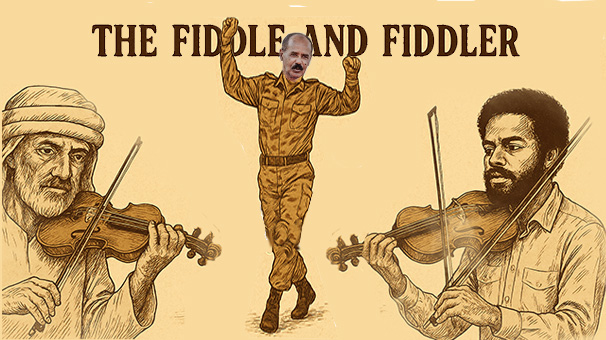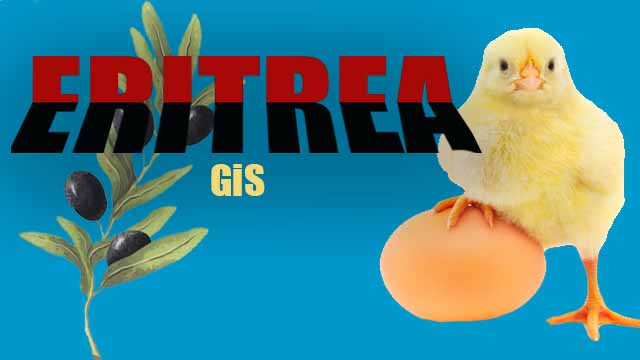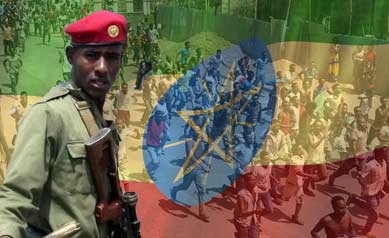The Fiddle and the Fiddler:

The Fiddle and the Fiddler: How the Arabs and TPLF Undermined the Eritrean Revolution
The story goes: when Haile Selassie dissolved the federation and annexed Eritrea, the Eritrean people erupted in rebellion, and thus the revolution was born. The war lasted thirty years, and ultimately, the Eritreans triumphed.
A compelling story. Many Eritreans dismiss the exaggerated and often-repeated Ethiopian claim that Eritrea—a territory they saw as theirs—was “sold to the Arabs.” This accusation is hyperbolic; no land was sold. But perhaps the cause was.
Egyptians who knew how their waters flowed offered scholarships to Eritrean students, hosted nascent Eritrean rebels, and financed their propaganda radios to mobilize the masses. From Khartoum to Cairo, from Damascus to Baghdad, young Eritrean rebels streamed into Arab cities. There, they learned or refined their Arabic, and many received military training to go with it. And even the notion that Eritreans are Arabs that still persists and that had once been a source of heated debate among Eritreans was born.
Along the way, Eritreans with the ability to read and write Arabic expanded their knowledge through Arabic literature, including the poetry of Al-Mutanabbi, who boasted of his courage and intellect:
“My words are heard by the deaf and read by the blind.
The steed, the sword, the desert, the pen, and the paper all recognize me.”
This famous verse is from a poem sometimes referred to as “the poem that killed its author.” Legend has it that Al-Mutanabbi had many enemies due to his sharp tongue. One day, while being pursued, he considered fleeing, but his servant reminded him of his own verse. Ashamed to retreat, Al-Mutanabbi stood his ground and was killed in the fight.
During their time in these Arab capitals, the Eritrean youth also encountered other inspiring verses, such as:
“My country is dear to me even if it has wronged me,
And my people are honorable, even if they were not uncharitable to me.”
Young revolutionaries in the nascent Gedli movement took these lines to heart. They pressed forward, refusing to retreat. Even when they were privy to what was happening and their dire future consequences to the posterity of the revolution and people. They recited Al-Mutanabbi and declared their loyalty to the land and people, no matter the cost. No matter if it wronged them, no matter if their people were cruel to them. I am with my armed forces, they said.
Another poem they encountered declared:
“If the people one day desire life,
Then fate must respond.
The shackles will break.
And the darkness will dissipate.”
That gave them hope—that someday, even if far in the future, the chains would be broken.
Thirty years passed. After devouring each other from within, the stars finally aligned. The Soviet Union was collapsing. God bless his soul, Mikhail Gorbachev ushered in Glasnost and Perestroika, and support for Ethiopia’s Derg regime dissolved. The Ethiopians were defeated. On May 24, Eritrea achieved independence.
People mistook it for the breaking of shackles, the end of darkness, and the arrival of liberty. The Egyptians, ever watchful of the Nile, listened to its current with their bare feet and saw that it still flowed deep. They wondered: what kind of stability would arise in Eritrea and Ethiopia? And they didn’t like the answer.
They had supported Eritrea’s rebellion not out of love but because they wanted eternal conflict. But when push came to shove, the Egyptians did not recognize Eritrea.
They could not believe their luck to last this long and bared their feet and sounded the depth of the Nile and found it not to be as deep as it used to be, and so they tuned their fiddles, dusted off the instruments, and prepared for the next performance. The one unfolding now. And Eritreans will find solace in the Arabic literature again, once again dancing to the tunes. It is beautiful. The steed knows us; the desert knows us; the mountains of Sahel know us; they will shout.
In the 2020 war, Eritrea sided with Ethiopia to attack and commit war crimes in Tigray, and many Eritrean opposition members sided with their government, abandoning their long-held beliefs against tyranny in keeping with the internalized: “My country, even if it wrongs me, is dear to me; and my people, even if they are unkind to me, are honorable.”
Now, the TPLF and PFDJ are in a ጽምዶ, as if to till the land together. But this word has a deeper, darker meaning. ጽምዶ is not just cooperation by doubling down the power of the beast; it is also a symbol of tyranny: forcing oxen to plow the land against their will. Yoked, controlled, enslaved, and harnessed.
The PFDJ’s message is clear: no matter how the oxen resist, tighten the grip—and they will submit.
As the saying goes: “ብዕራይ ናብ ዘበል የብል፣ ዕርፊ ጥራይ ኣጽንዕ.”
“Even if the ox refuses to turn, force the yoke—tighten the handle.”
It’s not partnership. Disguised as cooperation and reconciliation, it is gaslighting of the masses to consent. Hegemony, as Antony Gramchi posited long ago.
The TPLF is playing its cards smartly, just as it did during the Gedli era. Back then, the TPLF was always in a precarious position. What if the EPLF had made a deal with the Derg? That was a real risk. But the TPLF navigated it wisely, just as an experienced driver would navigate the road from Asmara to Keren.
When it suited them, they collaborated with the EPLF to dismantle the ELF. Then, once that was done, they clashed with the EPLF and remained at odds until 1989. This current ጽምዶ (temporary alliance) feels like deja vu.
The TPLF reconciled with the ELF back then because they needed help. Then Meles Zenawi charmed the West and secured international support. Meanwhile, the CIA’s favorite boy, Isaias Afwerki, was left isolated. By 1998, the TPLF was ready to strike. And strike they did.
Now, they are repeating the same recipe. And yes, it may save them, albeit only for a short time.
Say it after me: “My country is not dear to me if it wrongs me; my people are not honorable if they are unkind to me. I have been desiring life for a lifetime. My country and my people should not take me for granted. If I provide my duties, I expect my rights“.
If you say this and internalize it as the boys of Gedli did with the beautiful words of Arabic of Al-Mutanabbi, it is the beginning of the dissolution of darkness and breaking of the shackles.



Awate Forum